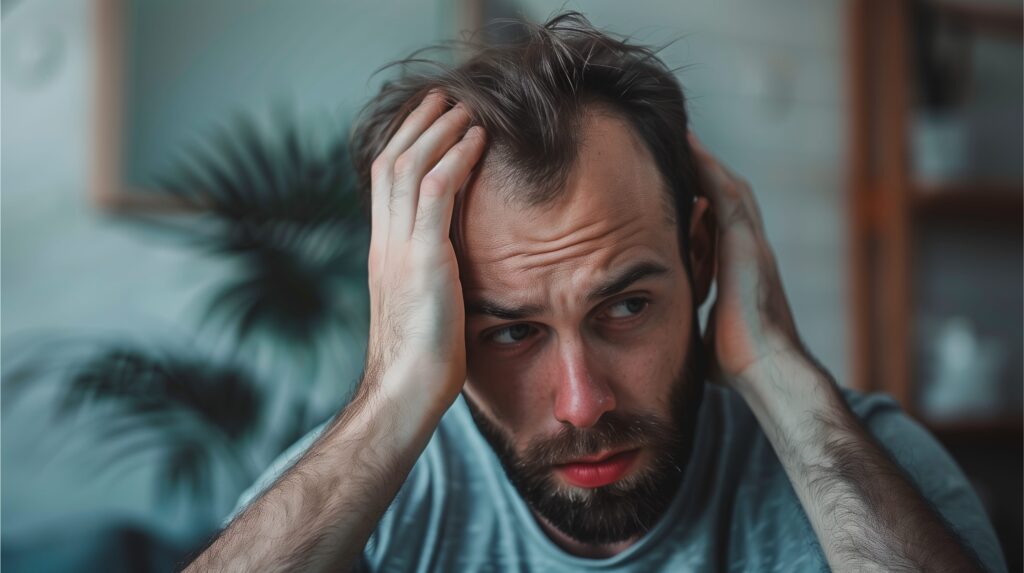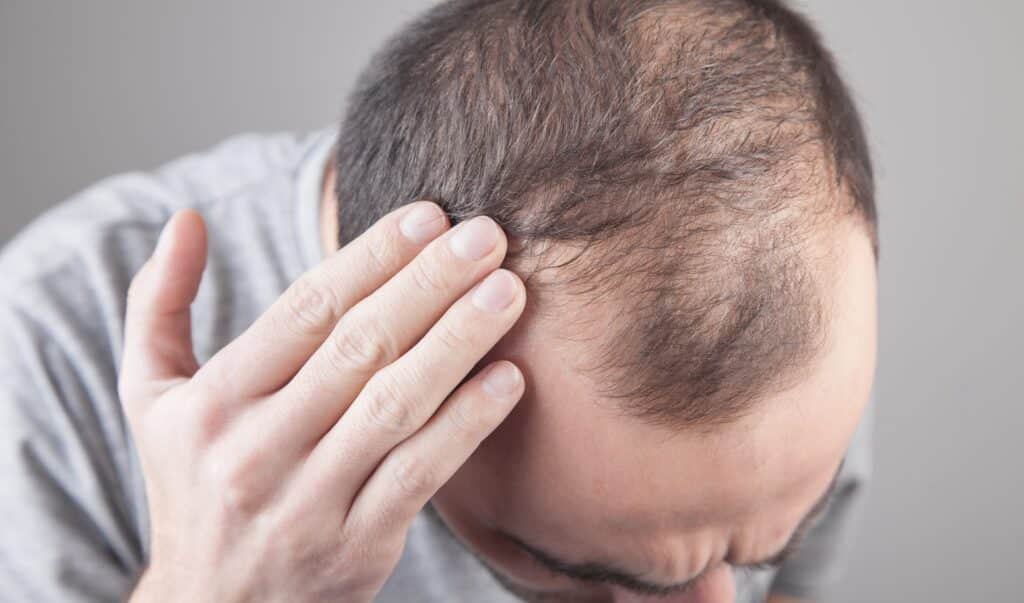Is Lexapro hair loss a thing? Antidepressant medications can cause a temporary form of hair loss called telogen effluvium. Lexapro (escitalopram) is a common selective serotonin reuptake inhibitor (SSRI) antidepressant. While hair shedding is not among the most frequent, many people suffer from excessive hair loss. The exact mechanisms behind SSRI-induced hair loss are not fully understood.
The shedding can be quite distressing for those already struggling with depression or anxiety. This comprehensive guide will examine the connection between Lexapro and hair loss. We will also explore potential causes and treatment options for Lexapro hair loss.
Does Lexapro Cause Hair Loss?

Hair loss is not listed as an official common side effect of Lexapro (escitalopram). Yet, clinical evidence suggests the medication can contribute to excessive shedding.
The biological mechanisms behind Lexapro hair loss are not entirely clear. Still, Lexapro can cause a temporary form of hair shedding known as telogen effluvium.
Many hair follicles enter the resting phase prematurely, which can lead to increased shedding and diffuse thinning. Researchers have proposed several other theories:
Hormonal Changes
Lexapro belongs to the selective serotonin reuptake inhibitor (SSRI) class of antidepressants. These medications can alter estrogen and prolactin levels, which can affect the hair growth cycle. Hormonal imbalances may force more follicles into the resting (telogen) phase.
Nutritional Impacts
Protein, zinc, iron, and vitamin D deficiency can disrupt the hair cycle. SSRIs can reduce the absorption or increase the deficiency of these micronutrients.
Effect on Hair Growth Cycle
Some evidence suggests SSRIs may interfere with the regular cycling of hair follicles. Antidepressants can alter serotonin pathways involved in regulating the hair cycle.
Lexapro hair loss can range from noticeable thinning to more substantial hair loss. Not everyone taking Lexapro will experience hair loss; genetics, age, nutritional status and underlying medical conditions can also play a role.
How to Stop Hair Loss from Lexapro?

If you are experiencing Lexapro hair loss, there are several strategies to mitigate this side effect:
Adjust Medication
Speak to your doctor about lowering your Lexapro dosage. You can also consider switching to an alternative antidepressant. Mirtazapine (Remeron), or venlafaxine (Effexor) usually do not cause hair loss.
Improve Nutrition
Ensure you are getting adequate intake of nutrients crucial for hair growth. Protein, iron, zinc, biotin, and vitamin D are hair-friendly multivitamin supplements.
Reduce Stress
High stress can exacerbate telogen effluvium and hair shedding. To manage stress, you can practice meditation, yoga, or other relaxing activities.
Use Gentle Hair Care
Avoid excessive styling, heat, chemical treatments, and vigorous brushing/combing. It can further traumatize fragile hair follicles. Use a gentle, sulfate-free shampoo.
Try Hair Growth Treatments
Medications like minoxidil and low-level laser therapy can stimulate hair growth by reactivating follicles in the resting phase.
Hair Transplants
If you experience excessive hair loss, you may want a more permanent solution. Hair transplant surgery may be an effective solution to restore full and natural-looking hair growth. Cosmedica Clinic offers these and other practical, affordable treatments.
What Are the Active Ingredients in Other Antidepressants That Cause Hair Loss?

Antidepressants in the selective serotonin reuptake inhibitor (SSRI) class can cause hair loss. These can include:
Bupropion (Wellbutrin)
Bupropion (Wellbutrin) can be an alternative to SSRIs. However, it is associated with a higher risk of hair loss for some patients. Clinical studies have found cases of telogen effluvium and diffuse hair shedding associated with bupropion use.
Fluoxetine (Prozac)
Fluoxetine is one of the most widely used and studied SSRIs. Studies suggest it can cause diffuse hair shedding.
Sertraline (Zoloft)
Sertraline can cause hair loss by inducing telogen effluvium. , though the risk appears lower compared to some other SSRIs.
Paroxetine (Paxil)
Paroxetine can cause excessive hair shedding and hair thinning.
Certain medications from other classes of antidepressants cause hair loss:
Tricyclic Antidepressants
Drugs like amitriptyline (Elavil) and imipramine (Tofranil) may disrupt the hair growth cycle.
Monoamine Oxidase Inhibitors (MAOIs)
Phenelzine (Nardil) may cause premature entry of hair follicles to the telogen phase.
Hair loss risk can vary based on the specific medication, dosage, and length of treatment. Not all patients will experience hair shedding with these antidepressants. Consulting a doctor is recommended for personalized risk assessment and management.
What Antidepressants Do Not Cause Hair Loss?
No medication is entirely free from potential side effects. But, some antidepressants are less likely to contribute to hair loss than others. These include:
- Mirtazapine (Remeron)
- Venlafaxine (Effexor)
It’s important to note that hair loss may still occur with these medications for some people.
Does Changing Your Antidepressant Cause Hair Loss?

Yes, changing antidepressants can trigger a temporary episode of telogen effluvium. The shift in medication causes premature entry of hair follicles to the resting phase. Starting a new antidepressant can alter hormone levels and neurotransmitter signalling.
It can also change other biological pathways involved in regulating the hair cycle. Even switching between drugs in the same class can be enough to disturb this balance. However, this shedding is usually temporary. It should subside once your body adjusts to the new medication.
Conclusion
Lexapro can be an effective treatment for depression and anxiety. However, the potential side effect of hair loss is concerning for many patients. A proactive approach can help you minimize Lexapro-induced hair loss and promote regrowth. Proper nutrition, reduced stress levels, and gentle hair care practices can help manage shedding.
If you’re experiencing Lexapro hair loss, discuss your concerns with your doctor. You can also contact Cosmedica Clinic to schedule a consultation. If excessive hair loss occurs despite these efforts, minoxidil, laser therapy, and hair transplant surgery can restore your hair.
The Cosmedica Clinic offers cutting-edge hair restoration options using the latest technologies. Don’t let the fear of hair loss deter you from getting the mental health treatment you need. Our experienced team can provide personalized guidance and effective treatment solutions to help you manage medication-induced hair loss and regain confidence.
